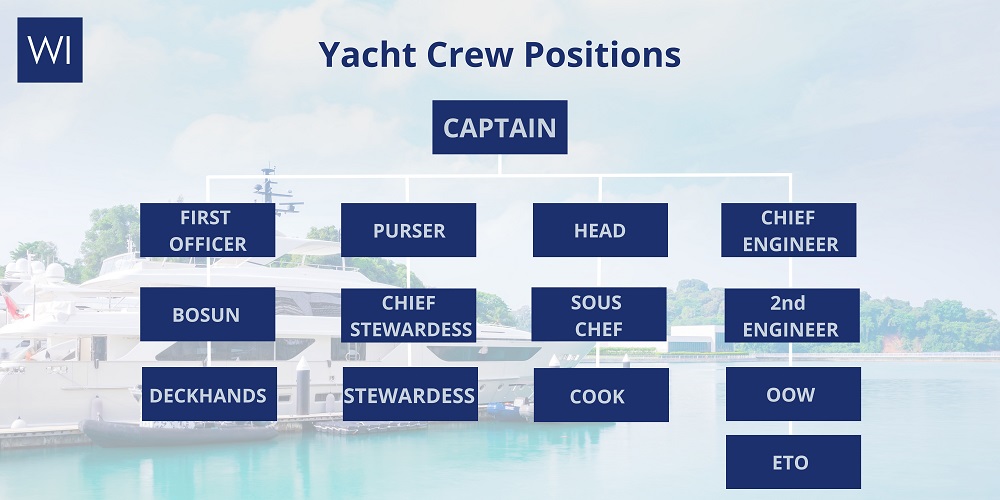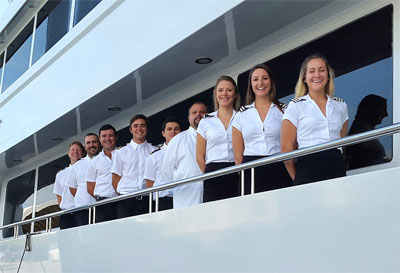Impartial training and careers advice
Call us: +441983 280 641
+441983 280 641
- How to become a Yachtie
So you’re thinking about becoming a Yachtie?
You may have a friend or relative who already works in the industry, or you have watched TV programmes like Below Deck , you know working on a yacht is the right for you, but where do you start?
With the potential to earn great money, travel, and work with loads of like-minded people, it’s not surprising this job ticks a lot of boxes for many people.
Becoming a Yachtie and getting paid to work on luxury yachts may seem like a job and industry that only the elite can have access to, or it just seems too confusing to start.
However, with an understanding of the requirements, certification, and having some expectations of what job role you should be looking for, starting work as a Yachtie will not seem so daunting.

What is a Yachtie?
Before we go any further, let’s make sure we are all singing off the same hymn sheet.
A Yachtie is a broad term used to describe anyone who works on a yacht. More specifically, it has become the term for people working as yacht crew on superyachts.
A superyacht is a very large boat that is extremely luxurious and often owned by multi millionaires and billionaires.
These Yachties who work on superyachts hold a number of different positions. Most Yachties will start their superyacht career working as a Deckhand or Stewardess. With more experience and responsibilities, your role will change as you progress up the career ladder.
It’s worth noting there are other types of yachting and Yachties. The other kind of ‘Yachtie’ could describe those who hold their Yachtmaster qualification and have jobs like skipper charter boats.
Job roles for new Yachties
Yachties new to the industry (also known as ‘Green’ Yachties) will traditionally apply for entry levels roles, which are Yacht Deckhands or Yacht Stewardesses.
These are both very different jobs, so you need to be sure which one you want to do and start training for that career path.
Yacht Stewardess (Stew)
A Stewardess, or Steward , looks after the interior of the yacht. This means anything that happens inside the boat, you will be responsible for it.
Think of any job in the hospitality industry and then combine it into one role on a yacht, that is what you will be doing.
From making beds, doing the laundry, cleaning, serving food, and hosting dinner, you will do it all to a 5-star standard. Anything less than perfect, and your guests won’t be satisfied.
It’s the small things that make the difference between high standards and exceptional standards. You must have a great eye for detail and be able to make sure no stone is left unturned. Everything on board the ship must be 100% perfect at all times.
You will be reporting to Chief Stew, who will be your manager and give you your task list. After a good few seasons as a green Stewardess, you will have enough experience and confidence to apply for Chief Stewardess roles.
Yacht Deckhand
In contrast to the Stewardess role, Deckhands look after the exterior of the boat.
Predominantly a male role, Deckhands will do everything from general maintenance to cleaning the teak deck, looking after the toys (Jet Skis, etc.), and even driving the tenders.
Deckhands should know how a yacht operates, the basic terminology used onboard, how to tie knots, and loads and loads of enthusiasm.
Deckhands may also dip in and out of helping the Stewardesses, and it isn’t uncommon for Deckhands to give a hand during busy evening meal preparation and service.
5 steps to Becoming a Yachtie
With an understanding of the job roles available, you can now decide which one best suits you. With the right attitude, qualifications, and knowing where to look for work, becoming a Yachtie is achievable for anyone who wants it.
- Have the right attitude
- Pass an ENG1 medical
- Complete STCW Basic Safety Training
- Gain experience
- Go to a superyacht marina
1. Have the right attitude
Along with gaining the correct qualifications to prove your competence, to become a Yachtie, you must have certain characteristics to thrive in this industry.
Yachties have to be well presented, articulate, know how to take orders, and be able to work hard, all with a smile and enthusiasm. You have to be able to work incredibly long hours, sometimes under stressful conditions, without losing your patience.
Having a job on a superyacht may sound glamorous, but if it’s your 10th day working in a row and you’ve got your head stuck down a toilet trying to clean it, you may want to think again. To become a Yachtie, you have to be happy with spending a lot of time away from home without seeing your friends and family. This may all seem obvious, but this situation does not suit everyone, and without careful consideration of the negatives, you will leave this industry quicker than when you arrived.
2. Pass ENG1 Medical
The first actionable step you need to take to become a Yachtie is gaining an ENG1 medical certificate. The ENG1 medical is an examination by an approved MCA (Maritime and Coastguard Agency) Doctor to make sure you are fit and able to work at sea.
Every single person working at sea must have an ENG1 medical certificate , without this, you are not able to start working on superyachts. The examination will take around 45 minutes, during which the doctor will go through a checklist to make sure you have no underlying health conditions that may impact the safety of you or anyone else on board the ship.
The most common reason new yachties fail the ENG1 is colour blindness. Surprisingly many people can go through their whole life without knowing they are colour blind. However, on board a ship, this can have huge implications. If you cannot identify signals and lights correctly, it will be impossible for you to help navigate the ship in an emergency. Unfortunately, this means you cannot start work as a Yachtie.
3. Complete STCW Basic Safety Training
Another requirement for working at sea is completing STCW Basic Safety Training . Similar to the ENG1 you can only get a job on a yacht if you have the STCW certificate.
STCW stands for ‘Standards of Training, Certification and Watchkeeping’. It is to make sure that all Seafarers have an understanding of what to do in an emergency and are aware of the procedures required.
STCW Courses are action-packed and quite a bit of fun. From fire fighting to sea survival, you will get stuck in learning, and learn loads of new skills.
4. Gain experience
If you are lucky enough to have a job offer on a superyacht, then having your ENG1 and STCW certificates will be enough.
Don’t worry if you haven’t already got a job offer, it’s quite normal to go through all these steps and not have a job lined up yet. If this is the case, gaining more experience and qualifications is a good idea to give you a competitive advantage over anyone else applying for the same job role.
This is achieved through signing up to a Deckhand or Stewardess Course. On these courses, you will get your standard STCW certificate and a list of extra qualifications demonstrating your competence, ability, and commitment to the industry.
Deckhands will learn how to drive a small yacht, engine maintenance, general yacht repair, and how to clean teak properly. Stewardesses will understand wine and how to serve it, the art of flower arranging, and how to drive a powerboat.
5. Go to a superyacht marina
After you have completed your superyacht training, now is the time to head out to France and look for work. Along with signing up to yacht crew recruitment agencies, going to one of the main superyacht marinas and handing out your CV to Captains is a great way to find work. This is known as dockwalking.
If you complete your Superyacht Course with us, you will have the option of signing up to our recruitment day in Antibes, France. We head out to France as a group, talk you through the process and offer you our industry contacts.
This is a great way to start your journey, and all our students find work in no time.
How much do Yachties make?
So you’ve heard you can make a good amount of money working on superyachts? Along with the travel, the great salary is why many people decide to become a Yachtie.
Like a job within any industry, salary varies. A Superyacht will agree on a crew salary budget with the owner of the yacht.
If you are just starting out, you can expect a salary of around €2,200 – €3,200 per month. However, the industry standard is €2,500 per month. Once you gain more experience and qualifications, your salary will increase.
When you look at the salary at face value, it looks great but not incredible, however when you are at sea, you have zero outgoings. Working on a yacht means you don’t have to pay rent, bills, or buy food which will save you heaps of money compared with working at home.
If you want to see the salaries of all yacht crew, check out our Salary Guide.
Do Yachties pay taxes?
Another reason why the salary is so appealing is that in most cases Yachties don’t have to pay tax.
This is a government scheme called the Seafarers Earning Deduction , and providing you are eligible, Yachties can keep 100% of their earnings.
To be able to apply for Seafarers Earning Deduction, you must be working on a ship outside of UK waters for a period of 365 days. This doesn’t mean you have to spend a whole year at once away from home, rather you can only apply once all the days you work on a yacht adds up to 365.
Being able to understand this tax scheme will be hugely beneficial before you start working on a Superyacht.
Download our free Guide
Want to know more about working on a Superyacht, please download our free guide .
Related articles
- Seafarers Tax
5 ways to ensure your SED claim is rock solid
The Seafarers’ Earnings Deduction, often referred to as the SED, is a tax legislation that enables seafarers to claim back their UK income tax. It a...
Do I need to pay off my Student loan if I work on a Superyacht?
Good question! First, let me say that the information below is aimed at people who have studied in the UK and took out a Student Loan to cover course ...
Have I got the right experience to work in yachting?
If you’re thinking about working on board a Superyacht, we share the skills and experience you need and how to get into the yachting industry in thi...

- Career Advice
- Salary Guide
- Digital Dockwalk
How to Get a Job as a Yacht Stewardess

Kate got her start in the yachting industry working as crew. She spent five years cruising the Bahamas, Caribbean, New England, and Central America, then segued that experience into a career in marine journalism, including stints as editor of Dockwalk and ShowBoats International .
If you’re not afraid of hard work, have a knack for hospitality and service, and are a team player, then traveling the globe as superyacht stewardess could be in your future. Here is everything you need to know to land a job as a stewardess on a luxury yacht...
A yacht stewardess (or steward) is an entry-level position in yachting that provides a gateway to a career in hospitality at sea. A stewardess serves a vital role as part of the interior team and is responsible for the upkeep and presentation of the interior of a vessel.
One of the greatest appeals of working as interior crew on a superyacht (other than travel and tips ) is that the role of a stewardess doesn’t require extensive schooling or qualifications. While experience in the hospitality or customer service sector is advantageous, when starting out as a junior steward or stewardess, it is more about having a friendly disposition and being willing to learn and work hard.
“The ideal junior stewardess will have an eagerness to absorb information and learn the ropes properly, the ability to take direction and follow instructions, as well as the confidence to ask questions when clarification or additional instruction is needed,” says Sarah Bester with Northrop & Johnson Crew Services .
What is a Yacht Stewardess?
A steward or stewardess maintains the interior of a superyacht and provides five-star service to its owners and guests. On charter or owner trips, the interior team handles beverage and meal service, housekeeping, and laundry, all with the highest attention to detail. They have the most face time with guests so are responsible for relaying their wishes to the deck department, chef, and captain.
What Does a Yacht Stewardess do?
A junior member of an interior team on a yacht larger than 45 to 50 meters will typically start his or her career in the laundry room and/or in housekeeping rather than in service.
On smaller boats, the stewardess can be a department of one. “If you’re a solo stew you’ll be up early doing it all,” says Alene Keenan, a 30-year veteran of interior work who has literally written the book on yacht service, The Yacht Guru’s Bible. The day starts with opening duties: “setting up for breakfast, preparing breakfast, serving and clearing breakfast, laundry, cabin service, housekeeping duties, more laundry,” lists Keenan. This is followed by lunch service and more housekeeping and laundry, ongoing beverage service, setting up for afternoon activities, cocktails and hors d’oeuvres service, dinner service, cabin turndowns, finishing and returning laundry, and to close the day, pulling dishes, décor, and service items for the next day’s breakfast.
“If you have two or more interior crew, the duties are shared and probably rotated, and start times depend on hours of work and rest,” Keenan says.
- Top Tips For Working as a Stewardess
On larger yachts, the chief stew will provide his or her team with a checklist of duties to perform for each shift. “The routine will generally be the same,” says Chief Stewardess Tracey Bamforth . “You will be allocated a shift, shift duties, and shift expectations. You will wake up and dress in your on-charter uniform, making sure you are presentable, fresh, and on time. It’s important to remember that when the guests are on, your need to manage yourself to the best of your ability: speaking softly, working smartly, being very aware of your environment — for example, not leaving cleaning products out and about and keeping the yacht to its absolute best standard.”
Off-charter is when maintenance, deep cleaning, and inventorying are done in addition to daily laundry, crew mess, and bridge duties.
Who Does a Yacht Stewardess Report to?
This varies depending on the size of the yacht and crew. “Every yacht is unique and could have a different set-up; nothing is black or white,” says Lien Eggermont, senior yacht placement consultant for interior crew at Viking Crew .
Generally, when a stewardess works alone, they report to the captain. When there are two or more in the interior department, the junior would report to the chief stewardess, or with larger teams, they may even report to the second steward/ess. For the largest of superyachts, each interior division — housekeeping, laundry and service — will have their own head of department (HOD), so for example a housekeeping stewardess would report to the head of housekeeping.
What Qualifications Do I Need to Become a Yacht Stewardess?
All crew need STCW basic safety training , a five-day course, and an ENG1 medical certificate , and some yachts may also require certification in Food Safety & Hygiene, a one-day course.
On top of these necessities, there are numerous options for yacht-specific interior training, but many chief stews, like Robert, prefer to teach on the job. “Most of the skills you need in yachting, especially in the interior, you learn as you go,” she says.
The amount of knowledge you need going in may depend on when you’re hired. “Early in the season, the HOD will have time to train and teach everything from scratch. Mid-season they don’t have time to hold somebody’s hand — in the nicest possible way — and will need somebody who can hit the ground running,” Eggermont says.
Courses that introduce entry-level candidates to yacht interior work are offered in many countries around the world. “Bluewater hosts some fantastic courses; their Yacht Interior Service courses start at a zero-to-hero course and can really help with a newbie or green stewardess who wants to acclimate and understand the principles and products used on a vessel,” Bamforth says.
Bester points out that additional courses like silver service and WSET (Wine & Spirit Education Trust) can help a candidate stand out. “These courses are an additional investment and thus an indication that the candidate may be more career minded,” she says.
- Recommendations for Entry-Level Interior Crew
“Training has always been a privilege in my mind,” adds Bamforth. “Most newbies starting out will already be stretched from arriving from a new country, trying to find a new role, living in a crew house, and then to expect them to start off with a couple thousand dollars in courses under their belts is somewhat unfair. I believe in the ability to train and trial a newbie and give them the opportunity to show you they have the capacity to work, learn, live in a very close environment with others, repeat the systems they are learning, and, most importantly, have a good attitude!”
Maxine Robert, chief stewardess on 47-meter M/Y Loon , adds, “Having a positive attitude is everything as we live in such close quarters and work very closely with each other every day.”
What Experience Do I Need?
“Many programs will consider junior stew candidates who are green to yachting but come with strong land-based hospitality experience,” says Bester. Eggermont seconds this: “Waitressing in high-end restaurants or hotels, background in events, housekeeper in a hotel or, for example, a boutique B&B. But also candidates who have worked on board cruise ships or river cruises will be considered.”
Keenan points out a wide range of work experiences on land that translate to interior work at sea, listing: “restaurant/hotel work, flower arranging , event planning, retail sales, anything with customer service.”
Furthermore, Bamforth says she considers a potential new hire’s complete background, including things like whether they have finished university — “my thoughts would be that they have a ‘stick it out to the end’ attitude, and an ability to think on their own, which is always a plus,” — or if they played team sports at school — “shows an aptitude for playing nicely with people.” She says she has enjoyed working with hires from a wide variety of backgrounds, from advertising to having a family member who is a florist. “Nurses or medical-trained candidates I find to be extremely empathic and good with other crewmembers,” she says.
How Much Does a Yacht Stewardess Earn?
The entry-level starting salary can range from $2,500 to $3,500 per month, says Bester at Northrop & Johnson. “Charter programs will typically be on the lower end of the salary range due to the additional income crew receive through charter tips,” she says. Eggermont at Viking Crew says the average is €2,500 per month.
Dockwalk conducts an annual salary survey that polls both placement agencies and working yacht crew. According to its most recent 2020 Salary Survey , the low end of the range given by agencies — where most junior crew would start — is between $2,250 and $2,800 per month. Interior crew who aren’t working as the chief or solo self-reported that they made from $3,000 to $4,500 per month, with the bigger bucks being netted on bigger vessels.
The earning potential of interior crew grows alongside experience. At the top of their game, a chief steward/ess on a vessel longer than 70 meters earns $7,000 to $12,000 per month, says Dockwalk ’s wage guide.
“I’d say don’t be too picky as a junior crewmember,” Eggermont says. “If a 90-meter-plus (yacht) offers you a role at €2,000 with potentially an increase after probation or so, I’d say take it. Do a season, do your best so that you get a great reference. You need a foot in the door!”
Related articles:
- What are the Different Crew Roles on a Luxury Yacht?
- How to Get a Job as a Yacht Chef
- Everything You Need to Know About STCW Training
- What is the ENG1 Medical Certificate and Why Do I Need it?
More from Dockwalk
Most popular on dockwalk.
- Yachting for beginners
- Owning a yacht
- Motor Yachts
- Sailing Yacht
- Indian Ocean
- Mediterranean
- Buying or Selling a Yacht
- Yachting Events
- FAQ – Luxury Yacht Charter
- FAQ – Buying a Yacht
- FAQ – Sell your Yacht
- How Much Does It Cost To Charter A Luxury Yacht?
- All our Blog Post & News

Yacht crew positions : Hierarchy, Missions & Salaries explained

Like any well-run hotel, restaurant, or other luxury service, a crewed yacht needs organized structure and good management. Whether you’re staffing your own luxury vessel or looking for an exciting career working and traveling the world, you need to know how this structure works, and what you can expect to pay or earn and do in the various roles on board.
Every yacht is a little different, and organization may reflect the style of the captain or the demands of the owner. But the same jobs need to be done on almost every boat. Organized with ranks, heads of each division report to the Captain. It’s not a military-style organization, but there are parallels with merchant marine grades and structures.
Smaller yachts need fewer crew, and staff may wear multiple hats that cross more traditional divisions and may combine some jobs with others. Large yachts have more distinct divisions or subdivisions, with more specialization to divide tasks and manage staffing. The core skills are the same, but finding staff with the right blends to do the jobs is key. Crew with broader skills are highly sought after.
As a yacht owner, you shouldn’t have to worry about day-to-day management decisions or organizing all this. That’s why you have a captain, and it’s better to leave staffing decisions entirely up to him or her. But it’s still important to know what it is people you’re hiring do, why they’re there, and how many you need. You don’t want too many crew, or to be short-handed. An understanding of what your yacht needs helps you talk to the captain to keep your yacht running how you want it.
For those looking to break into yacht crew work, consider your skills and strengths, and what jobs appeal to you. You’ll need training before you work, and you can direct your job path through the training you seek. Your goal is a suitable position on a well-run yacht, so make yourself the most attractive candidate possible.
Yacht Work Life

Working on a yacht is also living on the yacht. Crew must have a space to sleep, food, and all the basics that any employee needs. Large yachts have space reserved for crew, and owners looking for quality crew should provide good working and living conditions. Your crew takes care of you, and you should take care of them.
Depending on where a yacht operates or what flag she flies, a variety of labor laws or rules may be in effect. These requirements may be for work visas, contracts and written agreements, and compliance with merchant and ship crew treaties and laws. Be prepared to have work and non-disclosure agreements between yacht and crew, though a few yachts skip this.
Seasonal Jobs
Many yacht positions are seasonal. Year-round employment is more likely for senior crew like the captain and department heads, but not all yachts see year-round use. And some yachts may use different crew in different locales between seasonal moves.
Any job listing should give seasonal information, with geographic information, the length of the season, and the prospects for year-round positions and repeat employment.
Hours, Salaries, and Expectations
Yacht crew is a service job at its core, and every yacht owner is looking for service-oriented people who understand how to deliver a hotel-quality living and restaurant-quality fine dining. Work experience in luxury hotels and restaurants is a big plus for some jobs, and makes breaking into yacht work easier.
Yacht work can be very demanding, with periods of intense work when the owner and guests or a charter party is on board. Long days aren’t uncommon, but often balance with slack time when the boat is empty of passengers. There is always work to be done, but there’s usually a chance for time off.
Most salaries are monthly, since many positions are seasonal. Pay ranges are commensurate with experience, rank, and responsibility. Private vessels usually offer higher base pay, as charter crew can earn tips on top of their base salary. Because of the demands of the lifestyle, compensation is good and you have minimal living expenses on board.
Benefits and Time Off
Because so many jobs are seasonal and may occur in different countries and locations, benefits offered to yacht crew vary widely. But it is not uncommon for crew to be offered health and accident insurance and a flight to the vessel. Living on board, you’ll get food, rooming (usually shared), basic toiletries, uniforms, and laundry. Yachts with a longer view may offer additional training to long-term prospects.
Time off is usually linked to boat use, and may be sporadic in-season or when the boat has the owner and guests on board. There will always be some time off, but it may be between very intense work periods.
Most crew jobs have an employment contract that meets the Maritime Labour Convention 2006 (MLC). This should spell out the contract period and duration, as well as salary, leave and time off, probationary periods, repatriation policies, and any other crucial details to meet the minimum international standards of crew welfare.
This contract should also contain shipboard policies on confidentiality and non-disclosures, drug and alcohol use on board, personal hygiene expectations, interpersonal relationships, and dispute resolution. Job expectations and requirements can also be included, with specific language about roles, tasks, and cooperation between divisions.
Note that all crew agreements will explicitly prohibit drug use on board, most limit alcohol consumption and ban hard liquor on board, and many boats have policies prohibiting intimate personal crew relationships. Because the crew is living on board full time and in close quarters, rules to maintain decorum and crew harmony may be in writing.
Training & Certificates
Two key certifications are required for yacht crew. Employers look for the STCW (Standards of Training, Certification and Watch-keeping for Seafarers) and the ENG1 (Seafarer Medical Certificate). Insurers generally require crew to have these two certifications or the equivalent.
The ENG1 isn’t a class. It’s a medical exam to ensure that the crew is physically fit to serve at sea and has no underlying conditions that may arise far from help. It’s best for prospective crew to secure the ENG1 before investing more time and money training.
STCW is a week-long class on the basics of onboard safety. This includes hands-on modules covering personal survival, fire safety, first aid and CPR, accident prevention, and security awareness. It needs to be refreshed every five years.
Shared, Hybrid, and Crossover Jobs
Larger vessels will have more defined duties and specific areas of responsibility. But smaller yachts may want the crew to have different roles in different situations. For example, a hybrid job description may read “3rd Engineer/Steward” and describe a role in engineering when the boat is empty but on inside crew when passengers are on board.
When hiring or seeking jobs be prepared to look for creative crossover skill sets to meet the needs of the vessel.
Extra Skills and Duties
Any extra skills outside the regular duties makes crew more attractive. From stewards who can teach yoga, give massages or play cocktail piano to deck crew who know how to water ski, SCUBA dive, or fish, anything that crew can bring to enhance the passenger experience adds value to the employee.
If you’re looking for a position, list the skills you’d be comfortable using. If a vessel owner is looking for something specific, spell it out and figure out how that special duty fits into the employee work day.
The Four Main Divisions

Most yacht crews break into four primary divisions which group related tasks and responsibilities together. While the grouping sounds like it’s by section of the boat, they’re really more functional. For example, stewards (Interior) will definitely serve meals, whether they’re in the main dining room or out on deck. Deckhands (deck) are going to be involved in painting, sanding, and varnish jobs anywhere on the boat.
The deck crew handles most of the exterior operations of the yacht, and runs it. Deck hands and crew keep the boat looking clean and shiny, and handling most vessel operations. This includes driving and operating the yacht, navigation, running all launches and ship’s craft, handling lines, and all maintenance and painting, washing, and shining.
2-Interior (or Inside)
Inside crew are primarily the stewards and housekeepers. Larger vessels will have a dedicated housekeeping staff separate from the stewards, but smaller vessels may not.
Stewards keep the interior clean, do all housekeeping, laundry, food and beverage service, cabin preparation, and anything else needed for the comfort of the passengers.
3-Engineering
Below decks, the engineering department ensures the safe and smooth running of all the ship’s machinery and electronics. Engineers are engine and systems specialists, and there will usually be a dedicated electronics expert. Most engineer jobs require professional training and certification.
Fine dining is a hallmark of the yachting experience, and a full-time galley crew prepares all meals for passengers and crew. The head chef plans the menus and provisions the boat, while junior chefs assist the head chef with meal preparation and keeping the galley spotless.
Yacht Job and Department Details

Departments are all organized in a hierarchy, with a department head reporting to the Captain. The clear chain of command makes for smooth operations, with all communications going up and down ranks. Junior staff will occasionally take instructions from other divisions as all crew is expected to help as needed. A captain or department head may organize staff differently, so reporting structures listed are guidelines only.
All salary ranges are monthly figures and are ranges based on yacht size and crew experience. Senior jobs on larger yachts have more responsibility than the same job title on yachts with smaller crews. Experienced crew are very desirable and can expect more pay for their positions.
Listed responsibilities are not exhaustive, and different yachts may allocate some jobs to different positions.
Read also: The yacht charter experience ladder
The Captain

The captain of the vessel is the overall decision maker for the yacht in all situations, including the safety of the vessel. The owner should leave the Captain responsible for operational decisions about hiring and staff and operating the ship. To become a captain requires years of experience and training, and a broad set of skills including yacht operations, personnel management, budgeting and finance. The captain works directly with the owner and owner’s representative, if the captain is not also acting as the representative.
On an organization chart, the Captain is usually placed in the deck division, but the Captain is always the senior-most crew on the yacht and all division heads report to the Captain.
Responsibilities include:
- Responsible for all navigation and running the yacht.
- Senior decision maker on all crew hiring.
- Manage repairs, refits, and yard work.
- Manage budgets and accounting. On larger yachts, this task ends more on the Purser, but the captain is always responsible.
- Ensure all paperwork, clearances, and legal requirements are completed.
- Primary contact with the owner or charter parties.
Reports to: The yacht owner
Salary Range: $6,000 to $22,000
The deckhands handle all the outside responsibilities of the ship, including cleaning and maintenance of the yacht and all the ship’s vessels and toys on board. Deck crew will have significant contact with passengers in this role, operating launches and delivering guests to and from shore and handling the toys.
All deck crew have watch responsibilities on passage, and daily responsibilities keeping the yacht pristine and clean. They will also do line handling and secure the yacht.
Deck department : Chief Mate/First Officer
The Chief Mate or First Officer is the second in command of the vessel, and left in charge when the Captain is not on board. The first mate has the requisite skills to stand in for the captain and run the yacht if needed and usually acts as the division head of the deck team.
The seamanship skills needed are similar to the Captain’s position.
- Primary safety officer for the yacht and all passengers and crew.
- Supervise and manage all operations on deck.
- Bridge watches on passage.
- Passage planning and navigation.
There may be additional mates on larger vessels, these 2nd, 3rd, etc. mates have similar responsibilities on rotation. But the first mate is senior and always second in command.
Reports to: Captain
Salary Range: $4,000 to $9,500 (First mate)
Second and more junior mates may earn $2,000 to $4,000
Deck department : Bosun

The Bosun is the senior deckhand and manages the junior hands on board. This will usually be the most experienced hand on board.
- Organizing all operations on deck.
- Coordinating the use, storing and launching of the ship’s boats, toys, and equipment.
- Managing the passerelle, watching passenger safety.
- Contact point for guest service on boats, toys, and trips to shore.
Reports to: First mate
Salary Range: $3,000 to $5,000
Deck department : Deckhands

Deckhands are constantly busy with maintenance, cleaning, polishing, and assisting guests as needed. They will assist other departments as needed or given special duties.
- Daily cleaning of the yacht’s exterior.
- Painting, varnishing, polishing.
- Line handling.
- Launching and operating dinghies and tenders.
- Repairs and carpentry.
- Helping guests as needed – everything from handling baggage and gear to embarking and disembarking.
Reports to: Bosun
Salary range: $1,300 to $3,000
Though every position on a yacht is service-oriented, the interior or inside crew provides the primary customer service. They will interact the most with the passengers daily, and they’re directly responsible for the quality of their experience on board.
Interior department : the Purser

The purser is the chief financial officer of the yacht and handles all the financial operations on board. Accounting, purchasing, payroll and hiring, and all money matters end up with the Purser. This is a senior staff position, and may be the interior department head. Smaller yachts may eliminate the purser’s job and add it to the captain’s and other senior staff duties.
Responsibilities Include:
- Accounting and bookkeeping for all financial transactions.
- Human resources and payroll.
- Handling logistics for all departments related to purchasing.
- Managing contracts.
- Event coordination, including off yacht bookings and payments.
- Primary administration of the boat’s business paperwork.
- Inventory and supply management.
Salary Range: $4,000 to $8,000
Interior department : The Chief Steward/ess

The chief steward or stewardess has primary responsibility for all service roles inside. Food and drink service, cabin preparation, and anything to do with helping the passengers be more comfortable and enjoy their stay. The chief steward will be inside crew with several years of experience.
The chief steward manages the interior staff, setting and enforcing vessel service standards. The chief steward ensures the crew delivers a five-star hospitality experience.
Chief Steward Responsibilities:
- Scheduling and training junior crew for meal and drink service and cabin preparation.
- Primary contact with guests for meals and drinks.
- Sommelier and wine service.
- Coordinate with the galley for meals and presentation.
- Decorate the interior, from flower arrangement to table settings.
- Arrange onshore activities and outings.
Reports to: Captain or Purser, depending on the yacht
Salary Range: $4,000 to $8,500
Stewards/Stewardesses
The stewards and stewardesses are the primary guest service staff. They will work closely with guests and passengers, and have daily contact with them as they meet most of their needs while on board.
Steward Responsibilities:
- Food and drink service.
- Room preparation and turndown service.
- Cleaning, polishing, housekeeping, and inside maintenance.
- Cabin detailing.
- Laundry, pressing, and folding.
- Help with outings, trips, debarkations.
Reports to: Chief Steward
Salary Range: $1,500 to $4,500
Housekeeping

Larger yachts may have a dedicated housekeeping and laundry staff. This will be part of the inside crew, under either the purser or the head steward. There may be a senior housekeeper, if there are more than one housekeeping crew on board.
Responsibilities are the cleaning and laundry portions of the steward’s job, and a laundry steward may spend most of her time inside the ship’s laundry.
An experienced Head of Housekeeping may earn from $4,500 to $7,000, while a Laundry Steward typically earns from $2,500 to $3,500.
Read also: CAN OWNING A YACHT TO CHARTER (REALLY) BE PROFITABLE?
Food service requirements on any yacht are high. Whether it’s a privately owned vessel or a charter, the expectations are always for top tier food service, with a variety of meals planned for the requirements of every passenger. Chefs and cooks prepare all meals on board for passengers and crew, but sometimes other interior crew may help with prep work or cleanup.
Smaller yachts have smaller galley crews, but the largest vessels may have an executive chef and several sous chefs. All chef positions require formal culinary training and experience, but cook positions are often entry level. Promotion from cook to chef is unusual without additional training.
Galley department : the Head / Executive Chef

On larger yachts, an Executive Chef will run the entire galley with the help of sous chefs and cooks. With an Executive Chef, there’s an expectation that the food and menus will be on a level with Michelin star-rated restaurants.
The executive chef brings a thorough understanding of food preparation and presentation, and moves food preparation past creative up to artistic. Job responsibilities are similar to a chef, but the job demands and the required experience and education are much higher.
Salary range: $7,000 to $11,000

The chef has overall responsibility for all meals on the yacht, from provisioning in remote places to hygiene and good safety. If there’s only one chef, she’s the head of the galley crew. Finding the best provisions in far away locations and making the best of local food availability is a major part of the job.
- Planning a delicious and varied menu for passengers.
- Sourcing all food and arranging transport to the yacht.
- Maintaining and operating within the galley budget.
- Preparing passenger meals with professional presentation and style.
- Cleaning and maintaining galley and galley equipment.
- Deliver menus and meals on time, while running an organized and spotless galley.
Galley department : Sous Chef
The sous chefs assist the chef in all aspects of running the galley, and may have independent assignments to plan and guest and crew meals. While not primarily responsible for provisioning, the sous chef will help with food selection, menu preparation, and planning. A sous chef must have formal culinary training.
Reports to: Head chef
Salary Range: $3,500 – $6,000.

Galley department : The Cook
Cooks may be entry-level positions or experienced, but do not require formal gastronomy education. They will assist the chef and sous chefs, cooking meals and dishes for guests and crew, helping with provisioning, and keeping the galley neat.
- Assist with provisioning and buying high-quality food from local sources.
- Follow all food handling and safety guidelines.
- Assist the head chef as needed, taking direction and guidance.
- Prepare guest and crew meals as required.
- Staying on top of galley inventories and supplies.
Salary Range: $2,500 to $3,500
Engineering

The engineering department keeps the yacht and all its systems working. Whether it’s the engines, electronics, air conditioning, or the plumbing – it’s up to engineering to keep it running.
There is considerable overlap with commercial shipping in the engineering field, as many of the same skills apply. And there is a broader range of qualifications and grades based on the size and power of the vessel. Job ratings may be set by required experience based on tonnage of ship or power of engines, with corresponding levels of pay and responsibility.
Unlike commercial shipping, engineers may get involved in other aspects of running the yacht, like helping with docking and water sports with mechanical toys.
Engineering certifications, training, ratings, experience and licensing are critical to hiring competent engineers, and for engineering crew it’s an important facet of career advancement. This is important for Chief and 2nd Engineers, which are often broken out by MCA (U.K. Maritime and Coastguard Agency) rating or other international equivalent.
MCA ratings for engineers Commercial and Private Yachts over 24m are:
Y4: Less than 200 Gross Tons and less than 1,500 kW engine power Y3: Less than 500 GT and 3,000 kW Y2: Less than 3,000 GT and 3,000 kW Y1: Less than 3,000 GT and 9,000 kW
There is also an unlimited rating for merchant vessels larger than the Y1 category. For discussing salary and responsibilities, we will include all ratings in one position description, but pay scales with the size of the yacht and any required higher ratings.
Chief Engineer
The chief engineer manages all aspects of keeping the yacht and its systems running. The chief engineer manages all the engineering staff, and directs all maintenance, repairs, troubleshooting and upgrades. This is a management position, but requires extensive hands-on technical experience and knowledge. Chief engineers on large yachts hold an MCA Y1 or Y2, smaller boats will have a lower rated chief and a smaller staff. Check Jooble.org to find abroad marine engineer vacancies.
- Provisioning, shopping, and stocking.
- Preparing passenger and crew meals.
- Following instructions and cooking under the direction of others.
- Galley cleaning.
- Follow food safety and storage procedures.
- Food pre-preparation.
Salary Range: $6,000 to $15,000
2nd Engineer
The second engineer is also a highly skilled position requiring a rating or license and several years of experience. This senior level engineer also needs knowledge of how to troubleshoot and maintain all yacht systems.
- Maintain and manage all engineering operations.
- Hire, train and supervise all engineers.
- Project manage all upgrades and retrofits, including managing budgets, contracts, and suppliers.
- Coordinate maintenance schedule for the entire yacht around the usage and seasonal schedules.
- Maintain costs and accounting for engineering operations.
- Design and handle all safety operations.
- Set and maintain standards for operations and cleanliness in the engine room.
Reports to: Chief engineer
Salary Range: $5,500 – $10,000
OOW (Officer of the Watch) Engineer
The OOW is a junior engineering position, but still licensed. There are two categories of OOW – MEOL (Marine Engine Operator License) and the more junior AEC (Assistant Engine Course). The overall responsibilities are similar, working to support the senior engineers and handle independent assignments. The AEC rating is entry level for licensed crew, but has training and certification.
- Support the chief in all projects.
- Maintain a clean, safe engine room.
- Perform all maintenance, troubleshooting and repair tasks as needed.
- Support motorized water sports.
- Occasionally assist with other vessel operations, like line handling.
Reports to: Chief Engineer
Salary Range, MEOL: $4,500 to $6,000 Salary Range, AEC: $2,500 to $3,500
Electronics/Technology Officer (ETO)
The ETO takes responsibility for all audio-visual and information technology on board. Ensuring passengers have access to the internet, movies, television, and music is a primary responsibility. This position carries a fair amount of passenger interaction, and an ETO needs good troubleshooting skills to go with customer service skills.
- Ensure all audio/visual and entertainment systems are always available for passengers.
- Assist passengers with personal technology and ship systems as needed.
- Conduct regular maintenance and upgrades of the network, information, and A/V systems around passenger schedules.
- Assist other engineers as needed, especially with electronic systems.
- Contribute as needed with other departments for boat and passenger operations.
Salary Range: $4,000 to $9,000
Junior Engineer
This is a lower or entry level position for someone with engineering skills but without formal licensing or certification. The junior engineer will help with safety and cleanliness, and assist in any engineering tasks as needed. The ability to solve problems and fix things opens this spot for anyone capable and willing to do the job.
- Help with cleaning, maintenance, and safety functions.
- Help anywhere needed on the yacht.
- Assist senior engineers as needed, taking direction and following instructions exactly.
- Constantly develop skills.
Read also: IS BUYING A BOAT A BAD IDEA?
Whether you are a yacht owner or considering entering this dynamic industry with an established and reliable crew, it is essential to have an understanding of the yacht’s hierarchical structure, mission priorities, and salary expectations. By doing your research on the complexity of yachting before hiring your team, you can confidently select the right group of experienced and qualified professionals for your needs. Staying up-to-date on top industry trends and knowing the capabilities of each type of yacht crew position will enable you to make sound decisions that support a safe and cost-effective journey. With quality personnel at your helm, you can cruise unhindered in luxury and explore new destinations with peace of mind.

Fractional Yacht Ownership : Everything you Need to Know
What is the best country to register your yacht offshore, you might also like.

Windward Yachts Launches WhatsApp Channel for Latest Updates

What differentiates a yacht from a superyacht or a mega yacht?

Chartering Requirements and Regulations: A Guide for Boat Owners
Working On Yachts
There are currently over 15,000 yachts in the world large enough to require professional, qualified yacht crew and as a result this industry is growing rapidly each year.
A career in yachting can be rewarding, exciting and a wonderful opportunity to travel the world and explore new horizons!
Wherever there is water, you have the potential to go. Traditionally the yachting industry in the Mediterranean runs from April until September and from November to April in the States & Caribbean. Having said that, the possibilities are endless with many yachts circumnavigating the world.
Yachting is an eye opening, ultimately fun industry that demands hard work, perfection and attention to detail. We work with yacht crew every day and have a deep insight into what new crew should do to make the most of their career. Here are our top ten tips for starting out.
You cannot work on board a luxury yacht without getting your basic qualifications first. Bluewater offers a full range of crew training courses for those just starting in the industry:
- STCW 95 Basic Training 5 Day Course
- Powerboat Level II 2 Day Course
- Interior Introduction 3 Day Course
- AEC 1 5 Day Course
We have a sample copy and lots of relevant advice on creating your first yachting CV within our 'Your CV' section.
Certain times of year are more favourable for new crew looking to join the industry. If you are going to Antibes or Palma, we advise end of March/April. Fort Lauderdale is different in that it is sunny most of the year, however there is a peak recruitment season around November each year.
In every yachting hub you will find english speaking bars and cafes filled with yacht crew. Make sure you go and explore to build your network within yachting. Although global, it is a small industry so make sure to present yourself professionally.
Finding your first position in yachting is the hardest. Make sure you are dock walking, looking for day work opportunities and handing out your CV. You may find that one day's work leads to a permanent role or other job interviews.
Read websites, follow yachting news, learn from other crew who were in your 'deck shoes' a few years ago. Good examples of yachting websites & magazines are:
- Bluewater bluewateryachting.com
- Dockwalk dockwalk.com
- The Crew Report thecrewreport.com
- The Triton thetriton.com
Apply for jobs, manage your course bookings and sign up for events.
You can buy pay as you go SIM cards either in newsagents or specialised telephone shops around the Mediterranean. This will help to save you money when job hunting!
Captains check Facebook and Twitter pages before interviews. Make sure any public images of you are professional and will not reduce your chances of employment. Once employed be sure to avoid any posts about your yachts, current location and inappropriate images.
A smart, professional appearance will win over shorts and a beach top.
The most important aspect when you are looking for work is to make sure your CV is up to date, well written and includes any relevant experience that you might have.
It is best to emphasize any hospitality experience or customer service skills you may have had, such as waitressing, hostessing, silver service, bartending, cooking, nanny/au-pairing, babysitting, flower arranging, cleaning and/or laundry experience.
Should you wish to join the engineering department, make sure you include all mechanical experience and qualifications, including all work done in refrigeration, air conditioning, work with engines, and any electrical work, electronics or AV/IT.
The most important aspect to include is any recreational sailing experience you may have had. If you are also qualified or experienced in woodwork or carpentry, have painting, polishing, varnishing know-how, then that is also great. In addition any diving, sailing, fishing, any water sports background are all fantastic skills that are easily transferable.
We deal with a great multitude of chef positions, ranging from crew chef to head chef. Most positions will require some form of culinary training, however some crew succeed in entering this department through the stew/cook route on a smaller yacht.
When filling in your online profile with us, make sure to only select positions that you are qualified to do onboard. Selecting more than 3-4 positions on your profile can confuse potential employers and effect our search results.
Your CV should be no more than two sides of A4, including your photograph (in colour, face on, without sunglasses).
Your CV should be in a word format to ensure it can be opened easily by all employers.
List all recent contact information, references and work history.
Including a personal statement, along with a clear objective can help distinguish you from other candidates and helps prospective employers grasp your long term goals.
Don't give employers an excuse to dismiss your CV, review and spell check it!
Salary Guidelines

Knowledge is power and the more you research, the more informed & on the ball you will be.
Make sure you have a printed copy of your CV with you and always arrive early and dressed in a smart way. Research the yacht, make yourself prepared & don't be afraid to ask questions.
The key to getting your first job is to network! Always carry a copy of your CV with you.
Remember the industry is a tight, professional network therefore it is crucial to communicate with others, walk the docks, distribute your CV and register with crew agencies. Bluewater is one of the longest-established crew agents - we have been finding people yacht jobs since 1991!
Keep the agencies up to date! Always make sure your profile has the correct location and contact numbers for you so we can get hold of you when we have the perfect role for you.
Your profile is essential to us finding you work, both now and in the future. We rely on the information you input to match you to the right jobs, so please make sure it is up to date and at least 85% complete. We receive thousands of vacancies each year, and search our database for the best candidates for each one... You will hear from us more often if you are checking in regularly! Once you find work you can set your profile to 'Not Available'.

Getting a Yacht Job - The Recruitment Process
The yachting industry is a notoriously difficult industry to get into; the old phrase ‘it’s who you know, not what you know’ springs to mind!
So how do you go about giving yourself the best possible chance of securing yourself that dream job aboard a yacht or superyacht? Our step-by-step guide is designed to help you understand the recruitment process - to help newbies to get their foot in the door and existing crew to find new and exciting roles within the industry.

Step 1 - Research
Are you cut out for the lifestyle.
Really think about whether you would suit working on a superyacht – not everyone is cut out for this lifestyle! As luxurious as it may sound, there's a lot of hard work to be done, both physically and mentally.
You’re often dealing with very wealthy and powerful owners, their families, and all their guests. The hours are typically very long and at the same time, you’re sleeping in shared cabins, away from home for extended periods of time, and personal privacy becomes a rarity – and you have to be able to handle all of this whilst maintaining the highest of spirits.
What are the job roles?
You will also need to understand the different job roles. The term ‘yacht crew’ refers to many different roles on board a superyacht; some are more hospitality-focused, such as a steward or stewardess, while others more skill-based, such as an engineer. Whilst you may be planning to enter the industry as a deckhand and work your way up, it’s important to understand the roles, duties, and responsibilities of all crew on board. See the different crew roles explained here .
Step 2 – Prepare
Make sure you have the right training.
There are numerous crew training providers within the superyacht sector and a range of courses and certifications – some of which are mandatory, such as some STCW certificates , while others will simply help you obtain a more desirable set of skills.
Having additional skills (such as another language) and your interests listed on your CV is a huge help in making you stand out from other applicants, so consider which, if any, additional courses you may want complete to help you in obtaining and succeeding in your chosen role before you actively start looking for work.
Get your CV sorted
First things first, you must make sure that you have an up-to-date and professional CV before you can get out there.
Step 3 – Get out there
Yachting hot spots and dock walking.
There are several ways to find work in the yachting world. It is highly recommended to move to the yachting hubs and hiring ports of the world (as crew jobs can come up at any time) and networking in the local yachtie hangouts to get yourself noticed. Different yachting hotspots have their peak periods. You can then be in the right place at the right time to hand deliver your CV to potential employers.
Dock walking is a good way of getting a job, mainly on small yachts. The usual way to obtain crew work is literally to walk the docks and marinas, visit crew agencies and even frequent pubs/cafés used by existing crew.
It is important to dress appropriately, as you are selling yourself. Make sure that you 'look the part' as first impressions count i.e. smart, wearing deck-shoes and a smart shirt (a yacht shirt if you have one).
Almost all crew begin their careers by first doing day work: single, one-off jobs which offer cash and valuable experience. Day work is casual work given by the half day or full day but can stretch into several weeks as the work requires.
It is actually the perfect way to trial different sizes and styles of yacht, to see first-hand how the crew dynamics work and to get a real feel of the work required before committing to a contract.
Of course, casual day work is highly sought after, so it is best to promote yourself as ready, willing and able for work by networking and making contacts and being in the vicinity of the yachts to be able to start work as soon as it becomes available.
Step 4 - Apply and interview
Online opportunities.
Of course, you will find a huge selection of luxury yacht crew positions advertised online. Make sure you register with a specialised super yacht recruitment job-board , such as Yacrew, and upload your CV so that you can easily apply for all suitable positions advertised there. Captains who are looking for crew use these sites to view CVs of suitable candidates.
Attend a job fair
You should also consider attending a specialised recruitment fair. The Cruise Job Fair taking place in London every year is the largest recruitment event within the cruise sector but there are always several recruitment agencies attending who are looking specifically for quality candidates for superyachts.
The advantage of attending an event like this is that you get to meet the recruiters face-to-face, hand over and discuss your CV, get valuable advice and immediate feedback.
Some training centres attend the job fair; they are able to give you valuable advice and help you on your way to getting the right training, skills and qualifications.
The interview process
If you are invited to an interview, then your CV has already caught the eye of the captain or whoever is recruiting for the position! It is important that you make a good impression when you meet in person.
Whether you are a newcomer hoping to land your first contract, or you have previous experience, make sure that you are punctual, smart, prepared with copies of your CV, licences, references, and any other documentation and brush up on your yachting terminology. Be confident, make eye contact and offer a firm handshake. Be clear about your objectives and your career path in the industry, what you will be able to offer as a crew member why you are a good fit for the job.
Of course this will not just be about assessing your skills and abilities, a large part of it will be about your personality and character and whether you will be a good ‘fit’ with the rest of the team on board.
Step 5 – Set Sail
Get on board.
If you are successful at interview, then you will receive a formal job offer to join the yacht.
Good luck and enjoy your time at sea!
Make sure you network as much as possible during the season – as there is a lot of "it’s who you know, not what you know" – and you never know when the next opportunity may present itself!
Career Advice:
Email address:
Remember me Forgotten password?
Password Reset
Enter your email address and we will email you a password reset link.
Email address:

All guides , Stewardess
How to kickstart your career as a yacht stewardess.
- June 23, 2023
Are you dreaming of a job that allows you to travel the world, work on luxurious yachts, and make lifelong friendships? Look no further! Becoming a yacht stewardess might just be the perfect career choice for you. In this comprehensive guide, we will walk you through the step-by-step process of how to become a yacht stewardess and embark on a thrilling and rewarding journey.
Section 1: Understanding the Role of a Yacht Stewardess
Before diving into the details of how to become a yacht stewardess, let’s first understand what this role entails. Contrary to popular belief, working as a yacht stewardess is not like working on a cruise ship. While cruise ships accommodate thousands of passengers and crew members, yachts are more intimate and cater to a select number of guests.
As a yacht stewardess, your primary responsibility is to provide impeccable and personalized service to the yacht’s guests. Whether it’s ensuring their comfort, attending to their needs, or creating a memorable experience, you’ll play a crucial role in making their time on board exceptional. Additionally, you’ll be responsible for housekeeping, service, laundry, and other tasks that contribute to the overall smooth operation of the yacht.
Section 2: The Benefits of Being a Yacht Stewardess
Working as a yacht stewardess comes with a myriad of benefits that make it an attractive career choice for adventure seekers. Let’s explore some of these benefits:
2.1 No More Daily Commutes
Say goodbye to rush hour traffic and monotonous commutes! As a yacht stewardess, your workplace is constantly changing, and you’ll wake up in a new and exciting location every day. Imagine starting your day on a remote Caribbean island or enjoying a Mediterranean sunrise in the French Riviera. The world becomes your office, and your daily commute becomes an adventure.
2.2 Living and Working with Friends
Working on a yacht means living and working in close quarters with a tight-knit crew. You’ll form deep bonds with your colleagues, creating a unique sense of camaraderie and friendship. When you’re off-duty, you can explore new destinations together, indulge in water sports, or simply relax on the yacht’s deck.
2.3 Great Earning Potential
Not only do you get to travel the world, but you also get paid well for it. Yacht stewardesses can earn substantial salaries, with starting wages ranging from €2500/month and upwards. Depending on your experience and the size of the yacht, you may even receive tips on top of your salary. Some positions may also offer tax-free income, adding to your financial benefits.
2.4 Excitement and Adventure
Life on a yacht is far from ordinary. Each day brings new experiences, whether it’s meeting interesting people, witnessing breathtaking sunsets, or exploring exotic locations. You’ll have the opportunity to attend glamorous events, host cocktail parties, and immerse yourself in the vibrant yachting lifestyle. Brace yourself for a thrilling and ever-changing adventure!
Section 3: How to Prepare for a Career as a Yacht Stewardess
Now that you’re familiar with the role and the enticing benefits of being a yacht stewardess, let’s dive into the steps you need to take to kickstart your career.
3.1 Pack Light and Smart
Before embarking on your yachting journey, it’s essential to pack wisely. As space on a yacht is limited, it’s crucial to travel light. Opt for versatile, lightweight clothing suitable for various climates. In warmer regions like the Caribbean, pack light jackets and comfortable summer attire. If you’re heading to the Mediterranean, consider bringing warmer clothes for cooler evenings. Remember, you’ll be sharing a cabin with limited storage, so choose a foldable bag instead of a bulky suitcase.
3.2 Have the Courage to Quit Your Job
To pursue a career as a yacht stewardess, you’ll need to take the leap and quit your current job. Embrace the excitement and possibilities that lie ahead, and don’t hesitate to leave behind the traditional 9-5 routine. By stepping out of your comfort zone, you open yourself up to new adventures and opportunities.
3.3 Arrive at a Yachting Hub
To increase your chances of finding a job as a yacht stewardess, it’s advisable to be in a yachting hub during peak hiring seasons. The two primary yachting seasons are summer and winter. In summer, yachts flock to the Mediterranean and the North East of the USA, while winter is dominated by the Caribbean. Plan to be in Fort Lauderdale, USA by October/November for the Caribbean season and Antibes, France, or Palma De Mallorca in April/May for the Mediterranean season.
During your time in these yachting hubs, consider staying in crew houses specifically designed for aspiring and experienced crew members. Crew houses offer affordable accommodation, a chance to connect with like-minded individuals, and an opportunity to unofficially start networking.
3.4 Complete Required Training Courses
Before you can work as a yacht stewardess, you must complete essential safety training courses. The most important course is the Standards of Training and Certification of Watchkeeping (STCW 95) or STCW basic safety. Additionally, you’ll need to obtain your Proficiency in Designated Security Duties (PDSD) certification. Look for reputable training schools in the yachting hubs mentioned earlier, such as our agency Remember, networking is crucial during these courses, as you may meet professionals in the industry who could potentially hire you.
3.5 Obtain an ENG1 Medical Certificate
To ensure your fitness for working on a yacht, you need to obtain an ENG1 medical certificate. This certificate is essential and supersedes any other medical examination. Book an appointment with an approved ENG1 doctor in advance, as waiting periods can be lengthy during peak seasons. Fort Lauderdale, being a yachting hub, has several qualified ENG1 doctors to choose from.
3.6 Craft Your Yacht Stewardess CV
When applying for yacht stewardess positions, it’s crucial to have an impressive CV that stands out from the competition. A yacht stewardess CV should showcase your skills, experience, and personality. Make it visually appealing by incorporating color and an attractive layout. Include a professional photo of yourself, an engaging “About Me” section, and details about your availability and current location. Don’t forget to mention your interests and hobbies, as they contribute to your personality and suitability for life on a yacht.
If you need assistance in crafting the perfect CV, consider reaching out to agencies like Yachtie Careers . They offer valuable guidance, STCW training, and other services to help you navigate your path to a successful yacht career.
3.7 Getting Your CV Out There
Once you have a polished CV, it’s time to get it in front of potential employers. There are several avenues you can explore:
- Crew Agencies : Sign up with reputable crew agencies that connect job seekers with yacht captains and owners. These agencies offer a free service, so be cautious of any agencies charging a fee.
- Networking : Yachting industry professionals often host parties and events to promote their brands. Attend these events to network with captains, crew members, and industry insiders. Building connections and showcasing your personality can lead to job opportunities.
- Online Job Boards : Explore online job boards dedicated to yacht positions. Submit your CV directly to interested parties or respond to job advertisements.
Remember, persistence and a positive attitude are key in this competitive industry. Keep refining your CV, attending industry events, and utilizing online resources to maximize your chances of landing a yacht stewardess position.
Section 4: Nailing Your Yacht Stewardess Interview
Congratulations! Your impressive CV has secured you some interview opportunities. Now it’s time to prepare and shine during the interview process.
4.1 Dress the Part
First impressions matter, so dress professionally and appropriately for your yacht stewardess interview. Opt for a tidy hairstyle, light makeup, and a polished appearance. Wear a polo shirt paired with a skirt, skort, or shorts in navy, black, or beige. As interviews often take place on yachts, it’s acceptable to wear flip flops or boat shoes, as you’ll be expected to remove your shoes before boarding.
4.2 Show Your Personality
During the interview, the interviewer wants to assess your compatibility with the existing crew. Let your personality shine by being friendly, enthusiastic, and confident. Demonstrate your willingness to learn new skills and adapt to the yachting lifestyle. Remember, the interview is not only about your qualifications but also about your ability to fit seamlessly into the dynamic yacht crew environment.
4.3 Highlight Your Transferable Skills
Even if you don’t have previous yachting experience, you likely possess transferable skills that are valuable in the industry. Emphasize your customer service abilities, attention to detail, and organizational skills. Mention any relevant experience in hospitality, event planning, or personal assistance. Your ability to provide exceptional service and meet guests’ needs is highly sought after in the yachting world.
4.4 Ask Thoughtful Questions
At the end of the interview, the interviewer will typically ask if you have any questions. Take this opportunity to show your genuine interest and curiosity about the role and the yacht. Ask about the yacht’s schedule, the current crew’s dynamics, and any specific details about the job. Thoughtful questions demonstrate your engagement and enthusiasm for the position.
Section 5: Embracing Life as a Yacht Stewardess
Congratulations! You’ve successfully landed a job as a yacht stewardess. Now it’s time to immerse yourself in this exhilarating and unique lifestyle.
5.1 Adjusting to Shared Spaces
As a yacht stewardess, you’ll be sharing living quarters with your fellow crew members. It’s essential to adapt to the shared spaces and practice good etiquette. Respect your crewmates’ belongings, keep shared areas clean, and be considerate of others’ schedules. Living harmoniously with your crewmates contributes to a positive work environment and enhances everyone’s experience on board.
5.2 Embrace New Experiences
Working on a yacht grants you access to extraordinary experiences and breathtaking destinations. Embrace every opportunity to explore new places, try new activities, and meet interesting people. Participate in water sports, attend glamorous events, and enjoy the stunning sunrises and sunsets that accompany life on a yacht. This is your chance to live life to the fullest and create memories that will last a lifetime.
5.3 Continuous Learning and Career Development
As a yacht stewardess, there is always room for growth and improvement. Take advantage of training opportunities and seek out additional certifications to enhance your skills. The yachting industry values continuous learning, so invest in your professional development to advance your career. Stay updated on industry trends, attend workshops, and network with fellow professionals to expand your knowledge and open doors to new opportunities.
Becoming a yacht stewardess is a thrilling and rewarding career choice for those seeking adventure, travel, and a chance to create lifelong friendships. By following the steps outlined in this guide, you can embark on a journey that allows you to explore the world, provide exceptional service, and embrace a unique lifestyle. So pack your bags, get ready to set sail, and make your dreams of becoming a yacht stewardess a reality!
Remember, for more assistance and guidance on your path to a yachting career, consider reaching out to Yachtie Careers . We offer STCW training and comprehensive support to help you navigate the complexities of the industry.
Safe travels, and enjoy your incredible journey as a yacht stewardess!

Yacht Deckhand Premium STCW

Yacht Stewardess Premium STCW

Yacht Stewardess Full STCW

Superyacht Deckhand Full STCW

STCW Training in Holland- A Comprehensive Guide

Top 10 best places to find a Yacht job in the Med 2024?

Top 10 Benefits of STCW Course Netherlands

Yacht Stewardess Training in Amsterdam

Yacht Crew Courses for Holland: Food Hygiene Level 2

Yacht Deckhand Training in United States: Upgrade Your Career at Sea

Best Yacht Deckhand Training in Florida: Advance your Sea Career
Superyacht crew training europe.

2024 Dates full. Book Final 4 spot for October date with payment plan “paylater50”
Get free yacht cv and yacht job offers

IMAGES
VIDEO
COMMENTS
Deckhands will learn how to drive a small yacht, engine maintenance, general yacht repair, and how to clean teak properly. Stewardesses will understand wine and how to serve it, the art of flower arranging, and how to drive a powerboat.
Entering the world of yachting requires a unique set of skills and qualifications, which are essential for ensuring a successful career. Obtaining the necessary certifications is a crucial step in becoming a yachtie, as these credentials demonstrate your competence and commitment to the industry.
How to work on a Superyacht. Follow this step by step guide for new yacht crew members: start in the yachting industry, pass your mandatory certifications, find your first job, and excel in private and charter yachts. Learn about daywork and dockwalk opportunities to land your first full-time job.
A yacht stewardess (or steward) is an entry-level position in yachting that provides a gateway to a career in hospitality at sea. A stewardess serves a vital role as part of the interior team and is responsible for the upkeep and presentation of the interior of a vessel.
Whether you are a yacht owner or considering entering this dynamic industry with an established and reliable crew, it is essential to have an understanding of the yacht’s hierarchical structure, mission priorities, and salary expectations.
Prepare Your CV. We have a sample copy and lots of relevant advice on creating your first yachting CV within our 'Your CV' section. Moving To A Yachting Hub. Certain times of year are more favourable for new crew looking to join the industry. If you are going to Antibes or Palma, we advise end of March/April.
Our step-by-step guide is designed to help you understand the recruitment process - to help newbies to get their foot in the door and existing crew to find new and exciting roles within the industry. Step 1 - Research
Become Yacht crew by getting the right qualifications and certificates. How to start working on yachts ? Simply select your location and position above and get full access to Yachtiecareers Training programme.
Look no further! Becoming a yacht stewardess might just be the perfect career choice for you. In this comprehensive guide, we will walk you through the step-by-step process of how to become a yacht stewardess and embark on a thrilling and rewarding journey. Section 1: Understanding the Role of a Yacht Stewardess
As a stewardess on a superyacht, your journey begins with obtaining the STCW (Standard Training Courses for Watchkeepers) Basic Safety Training certification. This four day course is not just a recommendation, it is mandatory for a reason.